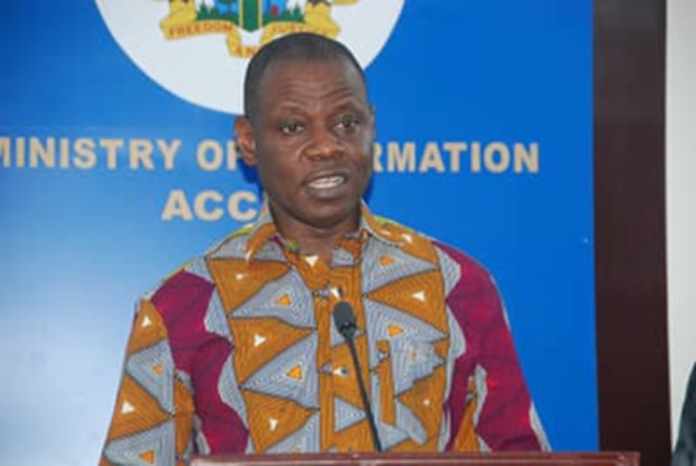
The Ghana Health Service will from Friday, January 20 to January 24, roll out the latest phase of a nationwide mass vaccination exercise to help increase the uptake of the COVID-19 vaccine.
The exercise is the sixth in the series of the National COVID-19 Vaccination Days Campaign launched in February last year, to enhance uptake and information flow.
For this latest campaign, all people aged 15 years and above, including pregnant women, are eligible to receive the vaccine.
The campaign is on the theme: ‘Protect Yourself, Protect Your Family, Get Vaccinated against COVID-19 Now!’
Launch, data
Launching it in Accra yesterday, the Director-General of the GHS, Dr Patrick Kuma-Aboagye, said so far 31 per cent of the national population were fully vaccinated.
He said the percentage represented 9,806,758 of the 18.2 million targeted number for herd immunity and 53.9 per cent of the 18.2 m target.
He said 12,878,326 people representing 70.6 per cent of the 18.2 million herd immunity target had received at least one dose also representing 40.6 per cent of the entire population.
Dr Kuma-Aboagye said while the numbers were encouraging and above the regional average, it was still far below the national target of 18.2 million for herd immunity to help reduce the country’s vulnerability to upsurge in other parts of the world, reduce spreading and impact in the country.
Safe and effective
Calling on people to avail themselves during the campaign and beyond, Dr Kuma-Aboagye the GHS reiterated that all the vaccines deployed were safe, effective and free and provided adequate protection.
“COVID-19 vaccines can and do protect the majority of people from hospitalisation and death, which is why as many doses need to be administered around the world as rapidly, and equitably, as possible. It is clear through the waves recorded that the unvaccinated were more vulnerable to death, severe illness and hospitalisation.
“And so I entreat everyone to go to the nearest health facility or vaccination centre to get vaccinated and not throw away the safety protocols. Remember no one is safe until all eligible persons are vaccinated,” he said.
On the rationale for the periodic campaigns, he said National COVID-19 Vaccination Days (NaCVaDs) campaigns had worked as an effective strategy for improving COVID-19 vaccination coverage within a short time.
He said the campaigns helped move administered doses from a little over 13 million in April last year to over 22 million as of January 13, 2023.
Update on vaccines
Providing updates on the vaccination, the Manager of the Expanded Programme on Immunisation, Dr Kwame Amponsa-Achiano, said in all, the country had taken delivery of 34,047,598 doses of vaccines and distributed 30,747,418 doses.
He reiterated that while many still had lingering concerns about COVID-19 vaccines, data proved that it was both effective and safe.
“Vaccination is now the mainstay of COVID-19 prevention. Vaccines save lives!!
Explaining the rationale for the mass vaccination days campaigns, Dr Amponsa-Achiano said COVID-19 continued to wreak havoc on healthcare systems and economies globally, making the country vulnerable to a spillover.
“The NaCVaDs campaigns have shown to be an additional key strategy that gets a lot of persons vaccinated within a short time. Five of such campaigns have been completed with notable success.
“The fifth was completed just before the festive season: anticipated influx/gatherings the 6th Campaign is due for today, January 20 to 24,” he said.
He said challenges faced included misinformation and disinformation; low COVID-19 infection risk perception and responding to multiple outbreaks -Marburg, Polio, Yellow Fever, Monkeypox and others.
WHO
In a speech read on his behalf, the World Health Organisation’s Country Representative, Dr Francis Kasolo, said the COVID-19 pandemic continued to rage on with the current surge being driven largely by the Omicron sub-variant XBB.1.5.
“Some countries, including China, have been severely affected and many others continue to record an increasing number of cases. As of 17 January 2023, a total of 662.7 million cases and over 6.7 million deaths had been recorded globally. Clearly, COVID-19 cases have been increasing in many countries.
“Ghana was touted as one of the countries that effectively managed to control COVID-19 pandemic. We achieved this largely through the use of non-therapeutic measures, including face masking, social distancing and hand hygiene.
ALSO READ:
Covid-19: Ghana Health Service warns of new variant
COVID-19: Accra still a hotspot – Ghana Health Service
“WHO continues to recommend the use of masks irrespective of the local epidemiological situation, given the current spread of COVID-19 globally. Social distancing and hand hygiene are encouraged not only for COVID-19 disease but also for water-borne diseases, including cholera.
